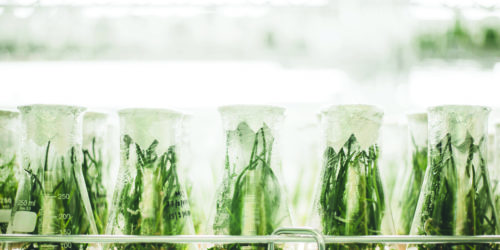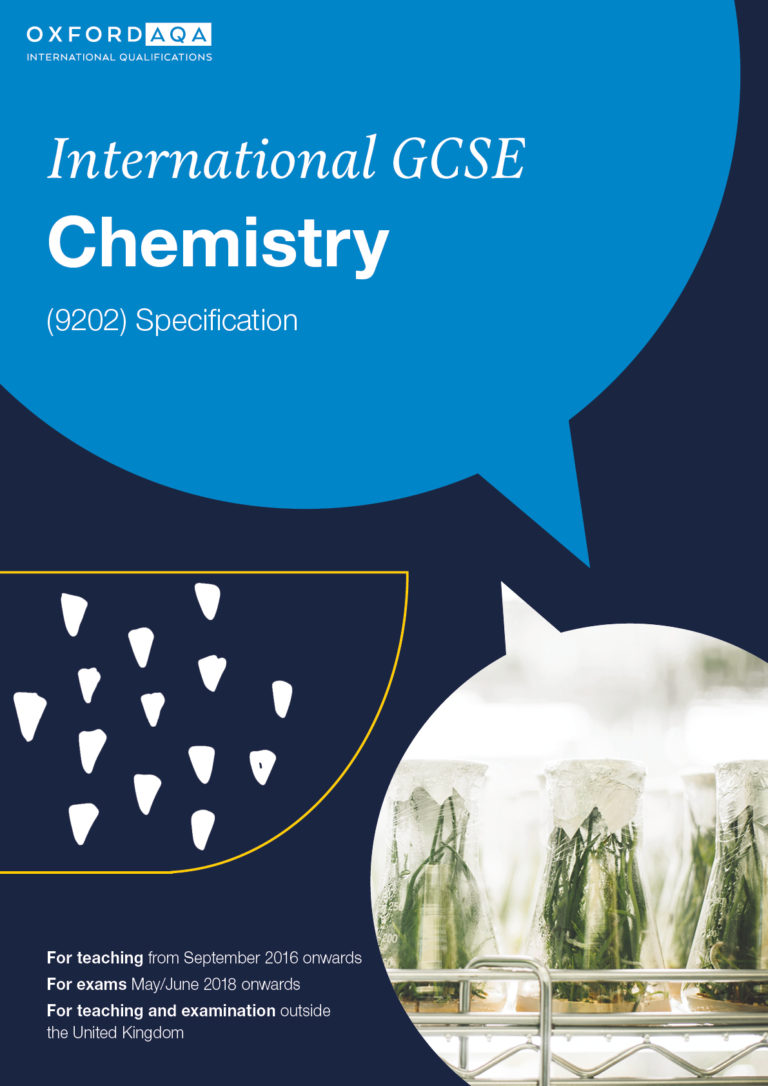
The ideal choice for students who want to study and excel in Chemistry at GCSE level and progress to further study.
This International GCSE Chemistry qualification contains a broad range of topics designed to engage students in chemistry whilst providing the knowledge and understanding required for progression to A-level.
- Practical components are flexible around local access to equipment and materials, with practical knowledge assessed through the main exam papers.
- Topics include investigating factors impacting the rate of a reaction and testing for the presence of a double bond in an unknown hydrocarbon.
- Our exam papers are carefully designed to avoid cultural or linguistic bias. Find out more on our approach to Fair Assessment.
All four International GCSE Science specifications include section 5.2 on Prohibited Combinations: centres cannot enter a student in a separate OxfordAQA International GCSE Science and the OxfordAQA International GCSE Combined Science in the same series.
International GCSE Chemistry (9202)
View the switching guide to see the differences between your old International GCSE Chemistry specification and the OxfordAQA specification (version updated November 2022).
OxfordAQA International GCSE Chemistry covers the following topics:
Atomic structure and the periodic table
- Solid, liquids and gases
- A simple model of the atom
- The periodic table
Structure, bonding and the properties of matter
- Chemical bonds: ionic, covalent and metallic
- How bonding and structure are related to the properties of substances
- Structure and bonding of carbon
- Nanoparticles
Chemical changes
- Metals
- The reactivity series
- Metal carbonates
- Electrolysis
Chemical analysis
- Purity, formulations and chromatography
- Identification of common gases
- Identification of ions by chemical and spectroscopic means
Acids, bases and salts
- The properties of acids and bases
- Preparation of salts
Quantitative chemistry
- Conservation of mass including the quantitative interpretation of chemical equation
- Use of amount of substance in relation to masses of pure substances
- The mole concept
- Using molar concentrations of solutions and amount of substance in relation to volumes of gases
Periodicity
- Group properties
- Transition metals
The rate and extent of chemical change
- Rate of reaction
- Reversible reactions and dynamic equilibrium
- Redox reactions
Energy changes
- Exothermic and endothermic reactions
- Calculating and explaining energy change
- Chemical cells and fuel cells
Organic chemistry
- Carbon compounds as fuels
- Crude oil
- Hydrocarbons
- Obtaining useful substances from crude oil
- Synthetic and naturally occurring polymers
- Organic compounds – their structure and reactions
- Alcohols
- Carboxylic acids
- Esters
OxfordAQA provides all the resources and advice you need to teach the International GCSE Chemistry specification effectively.
- Download the specification
- Read our switching guide
- View our training courses to help you deliver OxfordAQA International GCSE Chemistry
- Approved textbooks and resources published by Oxford University Press
We have too many International GCSE Chemistry resources to list here, so please visit our resources for teachers area to see them all, including:
- Schemes of work to allow you to plan how to deliver the specification in a way that will best suit you and your students
- Teaching guidance to outline clearly the scope of teaching and learning
- Topic tests and mock exam analysers to allow you to track your students’ progress throughout the teaching year
Paper 1:
- Any part of the specification may be assessed
- 1 hour 30 minutes
- 90 marks
- 50% of GCSE
Paper 2:
- Any part of the specification may be assessed
- 1 hour 30 minutes
- 90 marks
- 50% of GCSE
This specification is designed to be taken over two years. This is a linear qualification. In order to achieve the award, students must complete all assessments at the end of the course and in the same series.
The exams will measure how students have achieved the following assessment objectives and the content reflects our approach to Fair Assessment:
• AO1: Knowledge and understanding of scientific principles.
• AO2: Application of knowledge and understanding of scientific principles and concepts in both familiar and novel contexts.
• AO3: Ability to describe, analyse, interpret and evaluate scientific information presented in different forms.
• AO4: Ability to select, describe and evaluate scientific procedures.
All four International GCSE Science specifications include section 5.2 on Prohibited Combinations: centres cannot enter a student in a separate OxfordAQA International GCSE Science and the OxfordAQA International GCSE Combined Science in the same series.
Re-sits
- Linear specification; individual components may not be re-sat.
- Candidates can re-take the whole qualification as many times as they wish.
Take a look at:
- The OxfordAQA International GCSE Chemistry switching guide
- Example specimen exam paper and mark scheme
You must be an approved OxfordAQA centre to enter students for our exams. Make sure you become an OxfordAQA centre before you start teaching a course.




